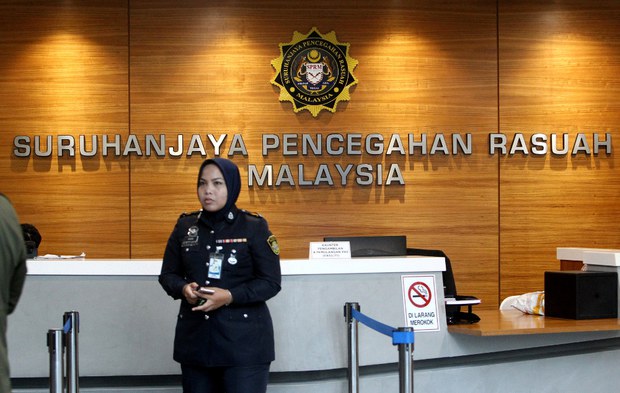Malaysian Authorities Seize Documents Linked with Chinese Projects
2018.07.18
Kuala Lumpur
 A security officer is on duty at the entrance of the Malaysian Anti-Corruption Commission headquarters in Putrajaya, July 3, 2018.
A security officer is on duty at the entrance of the Malaysian Anti-Corruption Commission headquarters in Putrajaya, July 3, 2018.
Malaysian anti-graft authorities seized documents during raids Wednesday on two companies in Kuala Lumpur responsible for three China-backed mega infrastructure projects in Malaysia, a lead investigator confirmed.
Officers with the Malaysian Anti-Corruption Commission (MACC) went to 13 locations in the city linked to the projects – namely the East Coast Railway Link (ECRL) and the Trans-Sabah Gas Pipeline (TSGP) and Multi Product Pipeline (MPP) – the agency’s director of investigations told BenarNews.
“We seized a few documents involving the projects,” Simi Abdul Ghani said, but declined to comment further.
The administration of former Prime Minister Najib Razak had awarded the multibillion-dollar projects to the Chinese companies, but Malaysia’s new government has suspended the three projects.
When he announced the suspension on July 5, new Finance Minister Lim Guan Eng partly justified the move by saying that the China Petroleum Pipeline Bureau, a Chinese state firm which was awarded contracts for TSGP and MPP in November 2016, had been paid 85 percent of the project value despite completing only 13 percent of the work on the two pipelines.
Both projects were handled by Suria Strategic Energy Resources Sdn Bhd (SSER), a wholly owned subsidiary of the finance ministry which was chaired by the former chief secretary of the treasury, Irwan Siregar Abdullah, who was linked to Najib.
Eng made the statement following media reports that the government of Prime Minister Mahathir Mohamad was investigating to determine if Najib’s government had used funds earmarked for the pipeline projects to pay off debt incurred by the financial scandal-ridden state fund, 1Malaysia Development Berhad (1MDB).
1MDB, Najib’s brainchild, was meant to spur national investment but has been subject to lawsuits and criminal investigations after billions of dollars allegedly went missing from the fund.
U.S. Justice Department officials described the 1MDB case as “the worst kleptocracy scandal in recent times.” The officials accused a Najib associate, fugitive financier Low Teik Jho (better known as Jho Low), of laundering more than $400 million stolen from 1MDB through acquisitions of properties in California, New York and London.
Last month, a Malaysian court charged Najib with criminal breach of trust and abuse or power in connection with 1MDB, but the former prime minister has denied that he committed any crime or stole the people’s money.
Singapore
Meanwhile, the Malaysian government appointed a Singapore-based law firm to represent its effort to reclaim money belonging to 1MDB that was frozen by the Singaporean authorities, according to a media report.
The Edge Markets, a business publication, reported that Attorney General Tommy Thomas had approved the appointment of Tan Rajah & Cheah to file an application at the High Court in Singapore against Jho Low and 52 other defendants to recover 1MDB funds.
Apandi Ali, the attorney general appointed by Najib while he was prime minister, cleared the PM of any wrongdoing related to 1MDB as the Malaysian investigation slowed. Mahathir’s government revived it after his Pakatan Harapan (PH) coalition came into power following an upset victory over Najib’s Barisan Nasional coalition in the May 9 general election.







